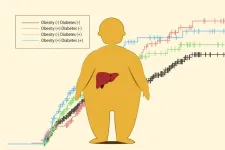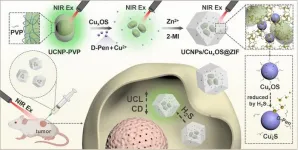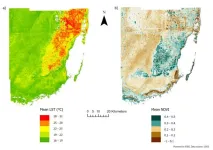(Press-News.org) Oxford, UK – Genomic Press has released a captivating interview with Professor Robin Dunbar, the eminent evolutionary psychologist and anthropologist whose work has fundamentally altered our understanding of human social networks. Published in the Innovators and Ideas section of Genomic Psychiatry, this in-depth conversation offers unique insights into Professor Dunbar's scientific journey and the far-reaching implications of his research.
Professor Dunbar, best known for conceptualizing "Dunbar's number" - the cognitive limit to the number of stable social relationships an individual can maintain - traces his path from philosophy student to world-renowned scientist. "Although I went to university to study philosophy, I was quickly attracted to psychology and animal behaviour, which converted me from a humanities person to an enthusiastic scientist," he reveals in the interview.
His groundbreaking work on the social brain hypothesis, which establishes a quantitative relationship between group size and brain size across primates, has had profound implications far beyond academia. It has influenced fields as diverse as social media design and organizational management, prompting questions about how digital technologies might be reshaping our social cognitive capacities. Could the rise of online social networks be altering the fundamental constraints Professor Dunbar identified?
The interview delves into Professor Dunbar's current research focuses, which include "building a better understanding of the structural constraints that limit the size of our social world" and "achieving a better understanding of its neurobiological underpinnings." This ongoing work raises intriguing questions about the potential for neuroplasticity in social cognition. How might interventions or environmental factors influence our capacity for social relationships?
Professor Dunbar's interdisciplinary approach, spanning psychology, evolutionary biology, and anthropology, offers a model for tackling complex scientific questions. "If we try to spend time in other corners as well, that often helps us see the big picture faster," he explains, highlighting the value of cross-disciplinary collaboration in scientific discovery.
The Genomic Press Interview also offers a glimpse into Professor Dunbar's personal philosophy and motivations. When asked about his greatest achievement, he cites "Dunbar's Number," noting, "It was completely unexpected, and so, at the time, it seemed just mildly interesting. Its significance became increasingly apparent later on – mainly thanks to other people's perceptiveness." This reflection raises questions about the unpredictable nature of scientific impact. How often do seemingly minor findings turn out to be revolutionary, and what can the scientific community do to better recognize and nurture such potential breakthroughs?
Professor Dunbar's work on the neurobiological underpinnings of social behaviour opens up exciting avenues for future research. Could a deeper understanding of these mechanisms lead to novel interventions for social disorders? How might this knowledge inform strategies for maintaining social connections in an increasingly digital world?
The interview, part of Genomic Press's innovative Innovators and Ideas series, not only highlights Professor Dunbar's scientific contributions but also provides a rare personal insight into the mind of a leading researcher. By combining probing questions about scientific work with more personal inquiries inspired by the Proust Questionnaire, the interview format offers a holistic view of the scientist behind the discoveries.
As social structures continue to evolve in the digital age, Professor Dunbar's insights remain more relevant than ever. His work prompts us to consider: How can we design digital platforms that better align with our cognitive social limits? What are the implications of his theories for mental health and well-being in increasingly connected yet potentially isolated societies?
The full Genomic Press Interview, titled “Robin Dunbar: The neurobiology of human sociality,” is available on 3 October 2024 in Genomic Psychiatry, offering readers an unparalleled opportunity to explore the thoughts and experiences of one of the most influential minds in evolutionary psychology and social neuroscience. The article is freely available online at https://gp.genomicpress.com/aop/.
About Genomic Psychiatry – Genomic Psychiatry: Advancing Science from Genes to Society (ISSN: 2997-2388) represents a paradigm shift in genetics journals by interweaving advances in genomics and genetics with progress in all other areas of contemporary psychiatry. Genomic Psychiatry publishes peer-reviewed papers of the highest quality from any area within the continuum that goes from genes and molecules to neuroscience, clinical psychiatry, and public health.
END
Robin Dunbar: Pioneering evolutionary psychologist redefines human social networks
Genomic Press Interview unveils Dunbar's journey from primate studies to groundbreaking social brain theory
2024-10-03
ELSE PRESS RELEASES FROM THIS DATE:
Balancing health: diabetes and obesity increase risk of liver cancer relapse
2024-10-03
Hepatocellular carcinoma, a type of liver cancer associated with hepatitis infections, is known to have a high recurrence rate after cancer removal. Recent advances in antiviral therapy have reduced the number of patients affected, but obesity and diabetes are factors in hepatocellular carcinoma prevalence. However, these factors’ effects on patient survival and cancer recurrence have been unclear.
To gain insights, Dr. Hiroji Shinkawa’s research team at Osaka Metropolitan University’s Graduate School of Medicine analyzed the relationship between diabetes mellitus, obesity, and postoperative outcomes in 1,644 patients with hepatocellular carcinoma ...
Duke-NUS launches new pictograms to clarify medication instructions, enhancing patient care
2024-10-03
Duke-NUS introduces 35 innovative pictograms to make medication instructions clearer, especially for seniors.
These visual aids are designed to ensure patients take their medications correctly and safely, with the aim of improving overall health outcomes.
The team looks to collaborate with healthcare institutions and pharmacies to standardise pictograms portraying medication instructions across Singapore.
SINGAPORE, 3 OCTOBER 2024 – Transforming patient care through clarity and simplicity, Duke-NUS Medical School has introduced visual aids or pictograms designed to make medication instructions clearer. ...
Chiral nanocomposite for highly selective dual-mode sensing and bioimaging of hydrogen sulfide
2024-10-03
With the continuous development of nanotechnology, more artificial chiral nanomaterials have been constructed. As one of the most representative optical properties of these chiral nanomaterials, CD is a powerful sensing technology. Compared with other analytical methods, CD signal has higher sensitivity, but it cannot achieve in-situ imaging in vivo. Scientists have managed to prepare chiral nanocomposites with more diverse biological functional properties to compensate for this shortcoming. However, some chiral nanocomposites assembled by electrostatic adsorption or other methods are easily dissociated and destroyed in complex physiological environments, resulting in performance ...
UCLA researchers develop new risk scoring system to account for role of chronic illness in post-surgery mortality
2024-10-03
FINDINGS
A UCLA research team has created the Comorbid Operative Risk Evaluation (CORE) score to better account for the role chronic illness plays in patient's risk of mortality after operation, allowing surgeons to adjust to patients’ pre-existing conditions and more easily determine mortality risk.
BACKGROUND
For almost 40 years, researchers have used two tools, the Charlson Comorbidity Index (CCI) and Elixhauser Comorbidity Index (ECI), to measure the impact of existing health conditions on patient outcomes. These tools use ICD codes that are input by medical professionals and billers to account for patient illness. These ...
Mount Sinai BioDesign expands industry collaborations to expedite and enhance the development of innovative surgical technologies
2024-10-02
Mount Sinai Health System today announced that Mount Sinai BioDesign, the medical technology incubator of the Health System, has expanded its reach to become a key, effective partner for the broader MedTech community.
Through synergistic partnerships between clinicians, technologists, and industry partners, Mount Sinai BioDesign is able to offer an array of services, including expert clinical and engineering feedback, preclinical trial development and execution, data gathering and analysis, and pivotal clinical study management. Mount Sinai BioDesign has already established several mature partnerships that have ...
Study reveals limits of using land surface temperature to explain heat hazards in Miami-Dade County
2024-10-02
Study Reveals Limits of Using Land Surface Temperature to Explain Heat Hazards in Miami-Dade County
The findings underscore the importance of further research to enhance our understanding of urban heat dynamics in subtropical and tropical regions, ensuring that heat mitigation efforts are informed by the most accurate data available.
A recent study published in the journal PLOS Climate on October 2, 2024, examines the effectiveness of using land surface temperatures (LSTs) as proxies for ...
The Lancet Public Health: Accelerating actions to eliminate tobacco smoking could help increase life expectancy and prevent millions of premature deaths by 2050, modelling study suggests
2024-10-02
First in-depth forecasts of future worldwide health impacts of smoking reveal potential effects of eliminating smoking on life expectancy and premature deaths by 2050.
Based on current trends, global smoking rates could continue to decrease to 21.1% in males and 4.18% in females by 2050.
Analysis indicates accelerating actions towards the elimination of smoking globally would increase life expectancy and prevent millions of premature deaths, resulting in 876 million fewer years of life lost (YLLs).
Reducing smoking rates to 5% by 2050 would increase life expectancy by one year among males and 0.2 years among females ...
The Lancet Public Health: Banning tobacco sales among young people could prevent 1.2 million lung cancer deaths, global modelling study suggests
2024-10-02
Analysis of the impact on lung cancer deaths of banning tobacco sales in people born between 2006 and 2010 indicates 1.2 million deaths could be avoided.
The findings suggest the creation of a tobacco-free generation could prevent almost half (45.8%) of future lung cancer deaths in men, and around one-third (30.9%) in women, in this birth cohort.
Nearly two-thirds (65.1%) of the deaths averted would be in low- and middle-income countries (LMICs). Close to two-thirds (61.1%) of all lung cancer deaths in high-income countries would be avoided.
Creating a generation of people who never smoke could prevent 1.2 million deaths from lung cancer globally, according ...
One million people who never regularly smoked now vape in England
2024-10-02
The number of adults vaping in England who have never regularly smoked has increased sharply since 2021, when disposable e-cigarettes first became popular, according to a new study by UCL researchers.
The study, published in Lancet Public Health and funded by Cancer Research UK, estimated that, as of April 2024, about one million adults who had never regularly smoked now vaped in England, a sevenfold increase since 2021, with most of them vaping daily and over a sustained period.
This increase was largely driven by young adults, ...
Methane emissions from dairy farms higher than thought - but conversion could reduce emissions
2024-10-02
New research has found methane emissions from slurry stores on dairy farms may be up to five times greater than official statistics suggest - and highlights the huge potential for turning them into a renewable energy source.
The study shows that if captured and turned into biogas, emitted methane could be worth more than £400m a year to the dairy sector in saved fuel costs, or around £52,500 for an average-sized dairy farm.
Capture technology already exists, and if rolled out across the EU dairy herd, the conversion of methane to biofuel could reduce emissions equivalent to an estimated 5.8% of the ...
LAST 30 PRESS RELEASES:
Tokyo Bay’s night lights reveal hidden boundaries between species
As worms and jellyfish wriggle, new AI tools track their neurons
ATG14 identified as a central guardian against liver injury and fibrosis
Research identifies blind spots in AI medical triage
$9M for exploring the fundamental limits of entangled quantum sensor networks
Study shows marine plastic pollution alters octopus predator-prey encounters
Night lights can structure ecosystems
A parasitic origin for the ribosome?
A gold-standard survey of the American mood
Tool for identifying children at risk of speech disorders
How Japanese medical trainees view artificial intelligence in medicine
MambaAlign fusion framework for detecting defects missed by inspection systems
Children born with upper limb difference show the incredible adaptability of the young brain
How bacteria can reclaim lost energy, nutrients, and clean water from wastewater
Fast-paced lives demand faster vision: ecology shapes how “quickly” animals see time
Global warming and heat stress risk close in on the Tour de France
New technology reveals hidden DNA scaffolding built before life ‘switches on’
New study reveals early healthy eating shapes lifelong brain health
Trashing cancer’s ‘undruggable’ proteins
Industrial research labs were invented in Europe but made the U.S. a tech superpower
Enzymes work as Maxwell's demon by using memory stored as motion
Methane’s missing emissions: The underestimated impact of small sources
Beating cancer by eating cancer
How sleep disruption impairs social memory: Oxytocin circuits reveal mechanisms and therapeutic opportunities
Natural compound from pomegranate leaves disrupts disease-causing amyloid
A depression treatment that once took eight weeks may work just as well in one
New study calls for personalized, tiered approach to postpartum care
The hidden breath of cities: Why we need to look closer at public fountains
Rewetting peatlands could unlock more effective carbon removal using biochar
Microplastics discovered in prostate tumors
[Press-News.org] Robin Dunbar: Pioneering evolutionary psychologist redefines human social networksGenomic Press Interview unveils Dunbar's journey from primate studies to groundbreaking social brain theory





